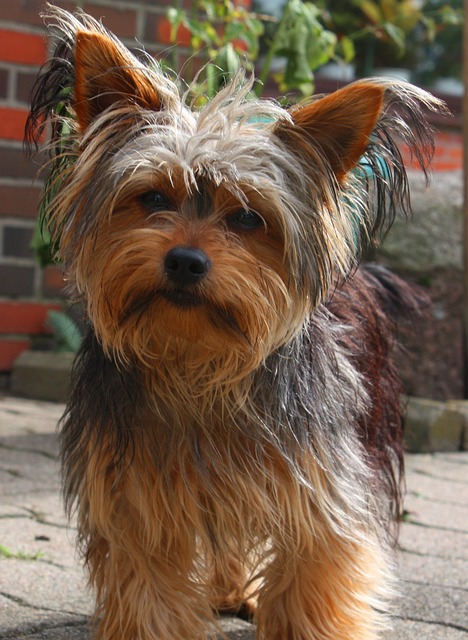


The Yorkshire Terrier, commonly known as the Yorkie, is a small but spirited dog breed with a big personality. Despite its compact size, the Yorkshire Terrier is known for being feisty, confident, and highly energetic. This breed is also recognized for its beautiful long, silky coat, making it a popular choice for dog lovers who appreciate a small dog with a luxurious appearance. Originally bred for hunting purposes, the Yorkshire Terrier is intelligent, independent, and often quite bold, making it a lively and loyal companion, especially for people who can provide plenty of attention and care.
The Yorkshire Terrier originated in England during the 19th century, where it was developed as a ratting and hunting dog. The breed was created by Scottish weavers who brought terriers from Scotland to Yorkshire, where they were bred to catch small vermin in mines and factories. The early Yorkshire Terriers were larger and more rugged than today's breed, but over time, selective breeding resulted in the smaller, more refined version we know today. Initially, the breed was prized for its ability to catch rats and other pests, and it became a popular choice among the working class. By the late 1800s, the breed gained popularity as a companion dog among the upper class, and the Yorkshire Terrier was officially recognized by the American Kennel Club (AKC) in 1885.
The Yorkshire Terrier is a small dog, typically weighing between 4 to 7 pounds (1.8 to 3.2 kg) and standing about 7 to 8 inches (18 to 20 cm) tall at the shoulder. The breed has a sleek, fine coat that is usually tan and steel-blue, with a glossy, silky texture. Their coat is one of their most distinctive features, requiring regular grooming to maintain its luxurious appearance. The Yorkshire Terrier's face is small and expressive, with dark, almond-shaped eyes and small, erect ears. The breed's tail is typically carried high and may be docked in some countries. Although small in size, the Yorkshire Terrier has a robust, well-proportioned body and an energetic personality that belies its compact frame.
Yorkshire Terriers are known for their lively, confident, and bold temperament. Despite their small size, they often display the characteristics of much larger dogs, including bravery, curiosity, and a strong sense of independence. They are highly social and form strong bonds with their families, often following their owners around the house and seeking attention. Yorkies tend to be alert and protective, making them excellent watchdogs, as they will bark to alert their owners of any perceived threats. While they can be a bit stubborn at times, they are also affectionate, playful, and enjoy being the center of attention. Though typically good with children and other pets, early socialization is key to ensuring they are well-behaved around unfamiliar people and animals.
Despite their small size, Yorkshire Terriers have moderate energy levels and require regular exercise to stay healthy and happy. They enjoy short walks, playtime, and mental stimulation, such as interactive toys and games. While they don't require as much exercise as larger, more active breeds, it is important to provide them with daily physical and mental activity. Yorkies are also known to enjoy indoor activities like chasing toys and playing games like fetch. As they are intelligent and quick learners, providing them with mentally stimulating activities can help prevent boredom and destructive behaviors. Yorkies thrive in homes where they receive regular attention and activity, but they are also content with a bit of rest and relaxation in between playtimes.
Yorkshire Terriers are intelligent and eager to please, but they can also be a bit stubborn and independent, so training requires patience and consistency. Positive reinforcement methods, such as treats, praise, and rewards, are the most effective ways to train a Yorkie. They respond well to clear, gentle commands and enjoy learning new tricks. Early socialization is important to ensure they are comfortable with other dogs, animals, and people. If not properly socialized, Yorkies may become overly protective or anxious around unfamiliar people or pets. Because of their small size, they are not typically recommended for homes with very young children who may not be able to handle them gently. However, when raised with children, Yorkies can be affectionate companions. It is also important to begin basic obedience training early to prevent any undesirable behaviors, such as excessive barking or separation anxiety.
Yorkshire Terriers are generally healthy dogs, but like all breeds, they can be prone to certain health conditions. Common health issues include dental problems, patellar luxation (knee issues), and tracheal collapse. Regular veterinary check-ups, along with a healthy diet and active lifestyle, are important for maintaining their overall well-being. Yorkies' coats require regular grooming, as they are prone to tangling and matting. Regular brushing, at least every other day, is necessary to keep their coat in good condition, and many owners choose to have their dog professionally groomed every few weeks. As a small breed, Yorkshire Terriers can also be prone to obesity, so portion control and regular exercise are key to preventing weight gain. Additionally, their small size means they can be more sensitive to temperature extremes, so it's important to keep them warm in cold weather and provide shade in hot weather.
The average lifespan of a Yorkshire Terrier is between 12 to 15 years, though some can live even longer with proper care. Providing a nutritious diet, regular exercise, and routine veterinary visits will help ensure that your Yorkie enjoys a long, healthy life. As they age, it is important to monitor for signs of health problems, such as changes in appetite, energy levels, or mobility. Early detection and treatment of health issues can help your Yorkie live a longer, more comfortable life.
© copyright Dog Compendium 2024 - 2026